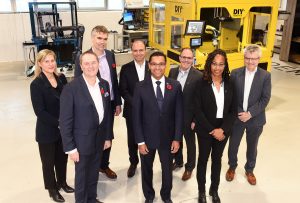In Quebec, it is estimated that only 20% of Ph.D. will pursue a purely academic path. Once restricted to universities and a few companies or institutions, researchers are now in demand even in SMEs, but the transition is not always easy. Beyond the academic and industrial world, there is a third way: the Industrial Innovation Centers, also known by the English acronym RTO.
Often described as the meeting point of these two universes, they are non-profit organizations whose main mission is to produce, combine and bring together various types of knowledge, skills and infrastructures in order to carry out a series research and development activities in collaboration with public and industrial partners. These centers offer very fertile ground to sow seeds and nurture the next generation in Quebec research. In this scenario, the Computer Research Institute of Montreal (CRIM) stands out for its activities in the fields of data science, artificial intelligence and software architecture.
Given the dazzling advancement of artificial intelligence in the last ten years and the synergy between academic research and the major technological tools of industry, we have seen the emergence of an enormous range of new applications and in several areas which, in turn, have stimulated new research and new tools. This momentum does not seem to be calming down, on the contrary, it is gaining even more momentum to reach an ever invaluable dimension, which highlights the role of researchers in the industry. And if the labor shortage affects almost all sectors, the world of research has not been spared. This recognition translates into excellent employment conditions and opportunities to continue their doctoral or post-doctoral studies. To do this, graduate and postgraduate students must take into consideration the reality of the industry and align their research with the practical needs of companies.
“At CRIM, researchers are immersed from the start in production teams where they work closely with engineers, data scientists and domain experts. They are integrated into project cycles with customers and partners, where they are confronted with the concrete realities of the industry: schedule, budget and resource constraints. They have to deal with insufficient data, unclear or poorly understood problems, manage quality control, risk assessment. » says Houman Zolfaghari, Director, Applied Machine Learning at CRIM.
The diversity of projects and fields of action also attracts researchers to industrial research centres. “Collaborating with multidisciplinary teams on a variety of subjects is very rewarding. You can have a career focused on health, but just as much exchange with researchers who work on projects on the environment, the preservation of indigenous languages or the identification of blue whales, for example”, says Benjamin Dalmas, industrial researcher at CRIM, whose atypical career began with a bachelor’s degree in economics and continued with a master’s degree in management information technology and finally a doctorate in computer science.
“While academic research favors a top-down approach, that is, a person who has a lot of knowledge on a specific subject and who explores it to produce even more knowledge, industrial research is rather bottom-up. -up: we start from a field problem to go up to the solution. In order to provide an answer to a problem, we call on knowledge in a parallel or simultaneous way, such as vision, audio, text or geospatial data. Seeing the concrete result of his work, whether it is a commercial success or an improvement in a societal issue, is the fuel of the industrial researcher », Benjamin said.
Located in Mile-Ex, the AI district of Montreal, CRIM accepts a number of interns each year who work closely with the research and development team on projects in various exciting fields. In addition, permanent and contract positions are often posted on the organization’s website at: www.crim.ca/career
*Article published in Le Devoir on October 21, 2022.





























